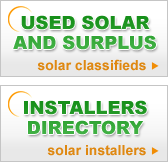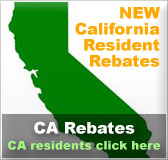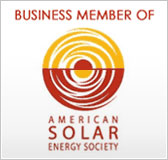Renewable energy tax credit:
-This tax credit is offered to residents of North Carolina who purchase
and install renewable energy systems and technologies such as solar,
wind, biomass, hydroelectric, renewable fuels, geothermal, anaerobic
digestion, etc.
-The tax credit is equal to 35% of the total cost of the equipment
and residential systems.
- Incentive amounts vary by technology and range between $1,400 and
$10,500.
-Excess credits may be carried over to the next five taxable years
by residents.
-Systems must be new and meet all safety and performance requirements
to be eligible for this tax deduction.
North Carolina GreenPower production incentive:
-This statewide program is intended to encourage residents of North
Carolina to use renewable energy.
-All grid-tied solar systems, wind systems and biomass resources receive
production payments for electricity generated by the customer.
-Qualifying generators are required to enter a power-purchase agreement
with their utility and North
Carolina GreenPower.
-Payments made are on a per kilowatt basis. Small solar electric
systems are paid an average of $0.19 per kilowatt-hour.
Property tax abatement for solar electric systems:
-All solar thermal electric (PV) systems have a property tax cut.
-80% of the appraised value of the system is exempt.
Active solar heating and cooling systems exemption:
-Solar water heating, solar space heating and solar space cooling
equipment and systems are exempt from property taxes up to the amount
of conventional equipment.
Residential energy efficiency and solar water heating loan
program – BEMC:
-This loan program provided by Brunswick Electric Membership Corporation
offers its customers low interest loans to help them make energy efficiency
improvements on their homes.
-Eligible improvements for this loan program include water heaters,
heat pumps, weather stripping and solar water heat systems.
-Loan amounts range from $3,000 - $5,000 at an interest rate of 5%.
-Participants must have good credit history and must be customers
of BEMC for at least one full year to qualify.
Utility-sponsored loan and rebate programs:
-Many utility loan and rebate programs are available throughout the
state of North Carolina provided by municipal cities and utility companies.
-Details and requirements for each program will vary.
-Loan and rebate programs are available to make energy efficiency
improvements are generally available for customers who purchase heat
pumps and water heaters and certain weatherization measures.
-Loan and rebate amounts vary.
Green power switch generation partners program – TVA:
-Tennessee Valley Authority offers a production incentive for installing
solar photovoltaics, wind, low impact hydropower, and biomass to customers
of participating TVA power companies.
-Green power switch is TVA’s green pricing program which provides
technical support and incentives for installing renewable energy systems.
-Through this program, TVA purchases the solar energy output at $0.12
per kilowatt-hour and all other renewable energy at $0.03 per kilowatt-hour.
-Payments are made in the form of a credit on the local participating
utility’s monthly bill.
-All new participants of the green power switch generation partners
program will receive a $1000 incentive to help offset initial cost
of the system.
Net metering:
-Net metering is available to customers who have facilities that
generate electricity through solar, wind, methane, biomass, hydropower
or geothermal systems.
-The power produced by the renewable energy system is used to offset
the kilowatt hours consumed each month. The incentive shows up as
a credit on the customer’s monthly bill.
-Systems must have a capacity of one megawatt or less to be eligible
for net metering.
Residential renewable energy tax credit:
-This personal tax credit allows the taxpayer to claim a credit of
30% of expenditures including labor costs and installation of qualified
residential solar-electric systems, solar water heating systems or
fuel cells. Small wind-energy systems and geothermal heat pumps can
also be accredited for.
-Solar-electric systems and solar water heaters have a maximum incentive
of $2,000 if placed in service before 2009. There is no maximum incentive
for systems placed after 2008.
-The excess amount of the federal tax credit may be carried forward
to the next taxable year if it exceeds tax liability.
-This can be carried forward until 2016, but after that, it is unknown
if the unused credit will be able to be forwarded.
Residential energy conservation subsidy exclusion:
-This is a personal exemption of 100% of energy conservation subsidies
provided by public utilities.
-The value of a purchase or installation of any energy conservation
measure by a customer such as solar water heat, solar space heat or
photovoltaics will not be included in the customer’s gross income.
-Customers of an electric utility company, who participate in the
utility’s energy conservation program, may receive a rate reduction
of electricity furnished or a nonrefundable credit against the purchase
price of the electricity on each monthly electric bill.
Energy-efficient mortgages:
-This is a federal loan program where homeowners can use EEM (energy-efficient
mortgages) to finance renewable energy technologies in a home.








